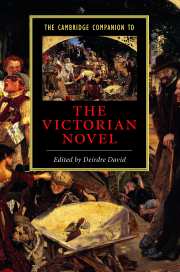Book contents
- Frontmatter
- Introduction
- 1 The Victorian novel and its readers
- 2 The business of Victorian publishing
- 3 The aesthetics of the Victorian novel: form, subjectivity, ideology
- 4 Industrial culture and the Victorian novel
- 5 Gender and the Victorian novel
- 6 Sexuality in the Victorian novel
- 7 Race and the Victorian novel
- 8 Detection in the Victorian novel
- 9 Sensation and the fantastic in the Victorian novel
- 10 Intellectual debate in the Victorian novel: religion, science, and the professional
- 11 Dickens, Melville, and a tale of two countries
- Guide to further reading
- Index
Introduction
Published online by Cambridge University Press: 28 May 2006
- Frontmatter
- Introduction
- 1 The Victorian novel and its readers
- 2 The business of Victorian publishing
- 3 The aesthetics of the Victorian novel: form, subjectivity, ideology
- 4 Industrial culture and the Victorian novel
- 5 Gender and the Victorian novel
- 6 Sexuality in the Victorian novel
- 7 Race and the Victorian novel
- 8 Detection in the Victorian novel
- 9 Sensation and the fantastic in the Victorian novel
- 10 Intellectual debate in the Victorian novel: religion, science, and the professional
- 11 Dickens, Melville, and a tale of two countries
- Guide to further reading
- Index
Summary
Novels are in the hands of us all; from the Prime Minister down to the last appointed scullery maid. We have them in our library, our drawing-rooms, our bed-rooms, our kitchens - and in our nurseries.
Anthony Trollope, 1870Victoria's coronation in 1837 signals the official inception of the literary form that we now designate the Victorian novel, just as her death in 1901 marks its official demise. However, for at least a century before the start of the period in literary history we term “Victorian,” the British novel had enjoyed cultural visibility and weathered critical scrutiny, so in a sense there was nothing momentously new about the novel in 1837. But critical discussion generated by the genre's increasing popularity in a profitable marketplace acquired a distinctive intensity as authors and literary intellectuals initiated an almost century-long debate about the moral and aesthetic nature of the novel. The central questions that fueled this debate tended to revisit with some regularity issues of whether novels should retain their racy affiliations with romance, teach uplifting moral lessons, educate curious readers about a rapidly changing society, or aim for a narrative singularity that would provide aesthetic correlation for the domestic realism that ruled the form for most of the period. By the end of the nineteenth century, after decades of cultural rule, novel-reading itself had become identified with those attitudes we now term “Victorian” (primarily to do with sexual repression, stultifying middle-class family life, and cramped vistas for women's lives), then being vigorously rejected. In George Gissing's The Odd Women (1893), for example, the feminist character Rhoda Nunn traces the defection from women's causes on the part of a Miss Royston to novel-reading, asking contemptuously, “What is more vulgar than the ideal of novelists?”
- Type
- Chapter
- Information
- The Cambridge Companion to the Victorian Novel , pp. 1 - 16Publisher: Cambridge University PressPrint publication year: 2000
- 4
- Cited by



